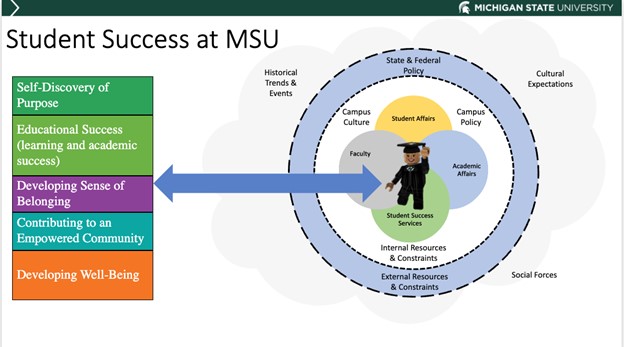
Since May 2024, the Spartan Undergraduate Experience Strategy team—Amy Martin, Maria O’Connell, and Wasek Sazaad—has been mapping the ecosystem of student success at MSU. Our goal is to understand, analyze, and align the many meetings and groups that contribute to student success, ensuring they work in coordination toward shared goals and outcomes.
Guided by the values of justice, equity, impact, critical hope, resilience, courage, and discipline, we aim to be informed and consistent leaders. Through advocacy and courageous collaboration, we strive to create equitable impact across the MSU student experience.
This summer, we reflected on the successes and challenges of the 2024–25 academic year. Drawing on feedback from participants in the Undergraduate Assistant & Associate Deans (UGAAD) group, Campus Student Success Group (CSSG), and Student Success Summit and Launch events, we reassessed our goals for 2025–26. As part of this process, we mapped the ecosystem of meetings, groups, and governance structures that influence student success, exploring how they relate to one another. We also applied theoretical frameworks such as the Collective Impact Model and change management phases (create a vision, organize for change, deploy change, evolve and sustain) developed by Project Manager Elizabeth Elliott in the Office of Accreditation, Assessment, Curriculum, and Compliance to guide our thinking.
We will share this evolving map at the September CSSG and UGAAD meetings and at the Student Success Launch on Sept. 15. Community input will be essential to refine and improve our understanding of the ecosystem.
New Strategies for 2025–26
Based on what we have learned, we are introducing two new strategies this year:
UGAAD as a Platform for Strategic Input
To reduce meeting time and enhance campuswide engagement, UGAAD will now serve as the primary platform for gathering stakeholder input on strategic initiatives. With over 100 representatives from colleges and campus units attending monthly, UGAAD is well-positioned to support this shift.
In addition to organizational updates and key student data, project leads will now use UGAAD to solicit feedback and direction on their initiatives. Reflecting this expanded role, UGAAD will now stand for Undergraduate Advice and Deliberation (formerly Undergraduate Associate and Assistant Deans).
Learning Community for the Five Areas of Student Success
Led by Maria O’Connell, UIA fellow and student success strategic initiatives manager; Rebecca Dean, director of assessment and data analytics; and Laleah Fernandez associate director, of institutional research, this year’s learning community will build on last year’s work, which engaged 65 campus partners in shaping the Spartan Experience Strategy Guide. The updated guide will reflect insights and corrections from those conversations. This year, the community will define metrics to measure progress in each area of success. Campus data scientists, assessment leads, and researchers will play key roles, and the community will remain open to all for engagement and input.
And finally, to continue these conversations with the larger campus community and other valuable stakeholders, we invite you to join us at the Student Success Launch on Sept. 15 to learn more and contribute to shaping the future of student success at MSU.
